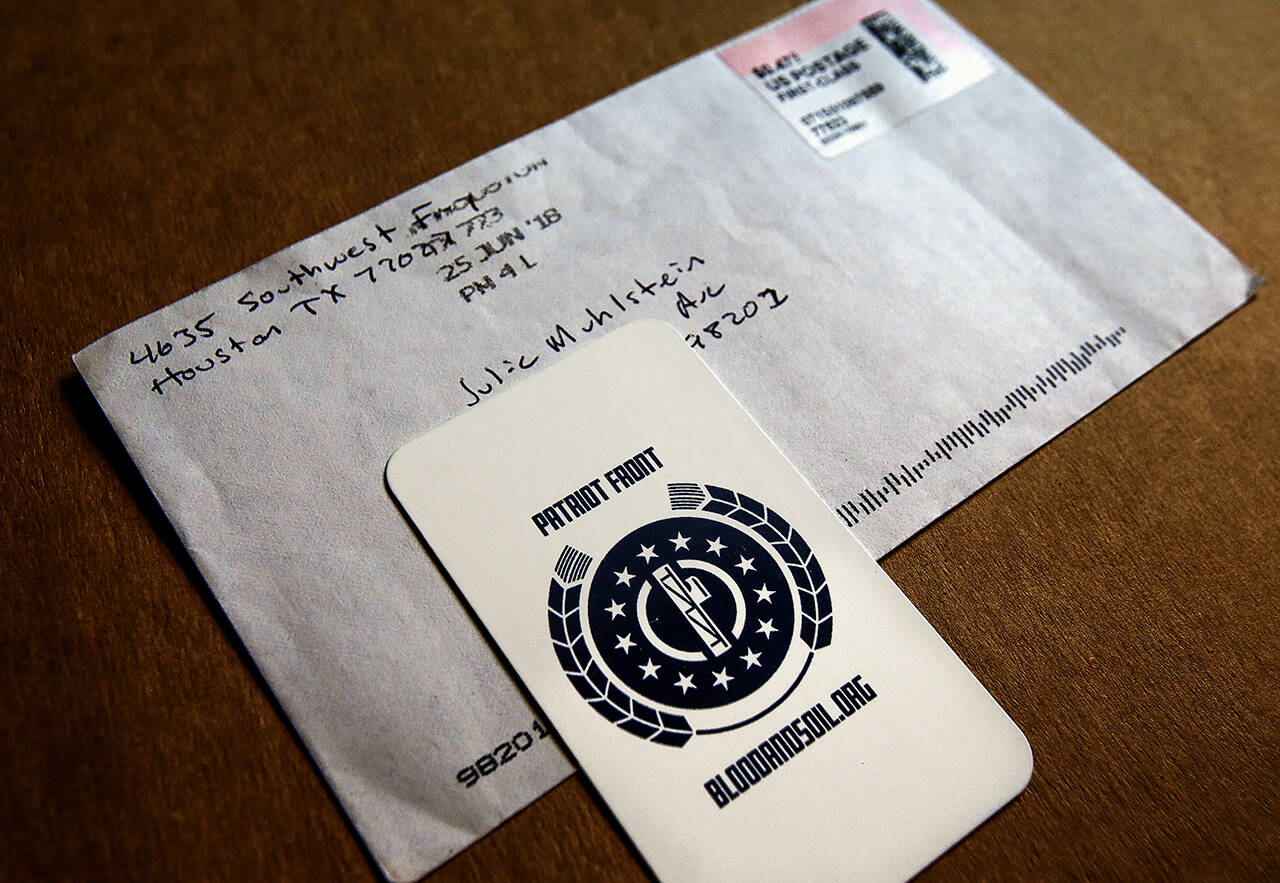By The Herald Editorial Board
Four men — two from Oregon, one from Idaho and a fourth from Tacoma — were sentenced last week to prison terms between 2 1/3 years and four years in length following guilty pleas for a racially motivated attack against a Black DJ from Everett at a Lynnwood bar in 2018. The four were among eight arrested after the beating, most “card-carrying white nationalists” who were seen flashing Nazi salutes on the bar’s dance floor.
The victim, who has since moved from the area, was left with permanent indentations to his head and a traumatic brain injury, after being beaten and stomped by the mob who yelled the n-word and made threats against the performer.
The attack was no outlier; not for the United States, not for the Pacific Northwest, not for Washington state and not for Snohomish County.
Of 562 reported hate crimes in Washington state in 2020, according to the U.S. Department of Justice — 372 against persons, 150 against property and four against society — about 58 percent were motivated by hatred of race, ethnicity or ancestry; 11 percent regarding sexual orientation; 10 percent on religion; and 4 percent on gender identity.
Snohomish County Council Member Megan Dunn, speaking last week before a state House committee, told the panel that as an elected official when constituents come to her describing such threats, vandalism and attacks, she is “frustrated with not knowing how to respond to domestic violence extremism.”
Dunn, seeking a better response, spoke of behalf of legislation, House Bill 1333, that outlines a path to better understand the threat of what’s being called domestic terrorism and “domestic violence extremism,” improve collection of data and statistics around hate crimes and incidents and find solutions, including a public-health approach toward prevention of extremism.
The bill is a result of a six-month study by the state Office of the Attorney General, which the Legislature requested last year. The office was asked to review federal, state and local laws regarding domestic terrorism, how acts of extremism are reported and tracked and what state and local policies and laws are in place to address extremism with the aim of improving data collection and strengthening law enforcement, prosecution and other government responses.
From the report’s findings and recommendations, Attorney General Bob Ferguson has urged creation of a state Commission on Domestic Violence Extremism, which over the next two years would bring together representatives of the office and other government officials, civil rights groups and law enforcement to, as described in the legislation:
Identify community-led and evidenced-based solutions to combat disinformation and misinformation, address early signs of radicalization and develop public-health responses;
Identify data-tracking recommendations around violent extremism and ensure its equitable use; and
Review civil and criminal legal tools and recommended new legislation and regulations.
The notion of using a public-health approach has earned the report and its legislation nationwide attention, including an interview of Ferguson on the national broadcast of the “PBS News Hour” on Jan. 25.
“I think it’s appropriate for states to take a more active role on addressing domestic violent extremism. And this commission can put forth recommendations to really address this challenge here in Washington state,” Ferguson told PBS White House correspondent Laura Barron-Lopez.
Noting opposition to the legislation during the House hearing that called the bill “Orwellian” and a “weaponization of public health against the constitutional right to free speech,” Barron-Lopez asked about the bill’s broad aims and nontraditional approach.
Where federal law’s definition on domestic terrorism focuses strictly on threats of death or bodily harm, Ferguson said he sees a need to take a broader approach to “address things that are not specifically a threat to somebody, but where the state can take some action in prevention, for example, take a more holistic approach, a public health approach, to address what we all see and know is happening in communities all across the country.”
That public health standpoint, the attorney general said, could focus on prevention, moving people away from radicalization through counseling.
The attorney general’s report recommends measures through which the state Department of Health could work with community groups to support intervention teams that would allow families and others to refer someone they suspect of being on the path toward radicalization and violence redirected through voluntary intervention.
It also advises training for the state’s Department of Corrections probation officers to help those in their supervision to avoid extremism; and would further use the public health model of prevention to address radicalization before it takes root, using civic education, media literacy and resilience against online content, propaganda and intentional disinformation.
Noting the concerns of several during last week’s hearing, nothing in this approach should be seen as a hazard to the First Amendment rights of freedom of speech or freedom of association, except when those rights are abused to foster threatening rhetoric and violent ideation. However, there is room during the commission’s two-year process and its four required public meetings to be transparent about its proposals so that its intent and protections of rights are clearly defined for all.
Treating hate and the violence that results from it as if it were a disease is unusual; no other state has proposed legislation using a similar approach. But considering the nature of acts with long-term and damaging consequences for both victims and perpetrators — as occurred in the Lynnwood bar four years ago — a response that emphasizes preparation, prevention and diversion from violent extremism deserves the further consideration such a commission can grant.
Talk to us
> Give us your news tips.
> Send us a letter to the editor.
> More Herald contact information.

























